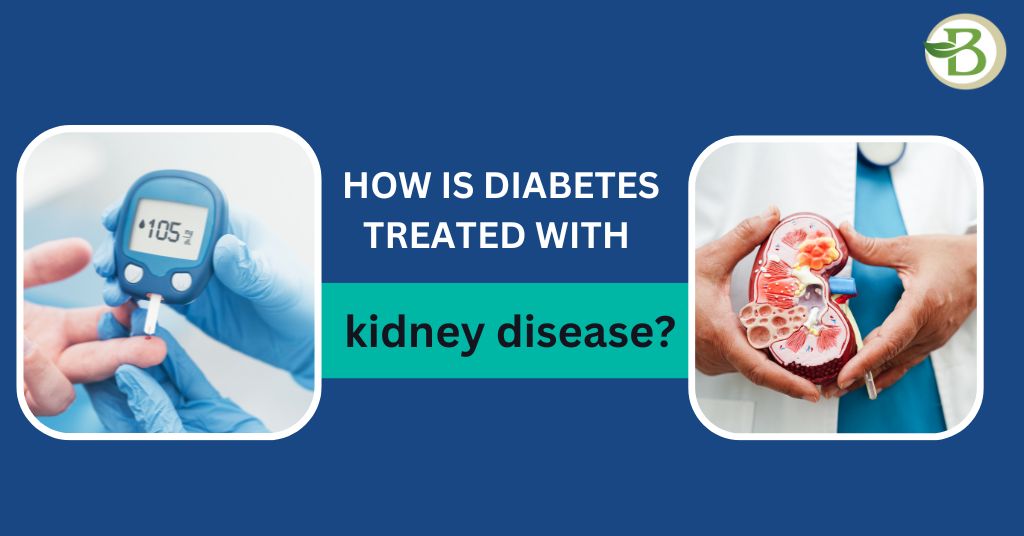Understanding the link between Diabetes and Kidney disease
Most kidney patients also have diabetes, or most probably, diabetes itself is the cause of their kidney disease. In fact, 30–40% of people with diabetes develop Diabetic Nephropathy ( a kidney disease arising due to diabetes). On the other hand, some patients can develop diabetes as a complication arising due to their kidney disease.
The link between both conditions is mutual since the presence of one may lead to the development of the other. So, it becomes important to opt for a treatment approach that simultaneously addresses both of the conditions. The objective of this blog is to examine both conditions and understand the connection closely. We will also shed light on effective clinical approaches to manage the conditions.
How does diabetes lead to kidney disease?
Diabetes is a lifelong medical condition characterised by abnormal levels of glucose in the blood. Let us have a look at what exactly happens in the condition;
- Insulin is a hormone that is secreted by our pancreas in the body. This hormone is responsible for transferring the glucose ( a type of sugar) present in our bloodstream to cells for energy generation.
- The main cause of diabetes is when our body is incapable of producing enough insulin or effectively using it.
- It causes significant damage to our blood vessels ( arteries and veins), heart, and kidneys. More than 420 million people have this condition worldwide.
Diabetes also acts as a risk factor for developing Chronic Kidney Disease (a long-term kidney disorder) and diabetic nephropathy. It mainly arises due to improper management of the condition. Here, we highlight the impact of diabetes on our kidneys;
- The primary function of our kidneys is to filter the blood and produce waste in the form of urine.
- The most important complication with diabetes is the abnormal sugar content that accumulates in our blood.
- If the blood sugar level is disturbed for a long time, it deteriorates the filtering unit of our kidneys and leads to renal dysfunction.
- Besides, diabetes also increases the chance of developing cardiovascular conditions like heart attacks and strokes.
- These conditions can also affect the working of our kidneys and can lead to severe health problems.
How does kidney disease cause diabetes?
Approximately 10% of the total world population have chronic kidney disorders. The challenging part is that kidney disease possesses no significant symptoms in its early stages. Because of this, before we diagnose kidney disease, it has already reached severe stages.
Many people are unaware that, along with filtering the blood, our kidneys can reabsorb extra glucose present in the blood if needed. The impaired kidney function can affect glucose levels in the blood and lead to insulin resistance, eventually causing diabetes.
How do we manage diabetes and kidney disease together?
Treating diabetes and kidney disease together is a combined effect of appropriate diet, suitable lifestyle habits, and, most importantly, required medical attention. After knowing the effects and relationship between the conditions, it’s time to discuss their treatment approach.
Diabetes and Kidney disease foods
People with both conditions must minimise the consumption of minerals such as sodium (salt), potassium, and phosphorus. At the same time, protein needs to be consumed in the right amounts. An easily digestible diet with minimal to no sugar content at all is the most appropriate diet for the patient.
Here are some recommended foods;
- Fruit: Strawberries, Grapes, Papaya, Apples, Plums
- Veggies: Cauliflower, Onions, Brinjal, Spinach, Garlic
- Proteins: Lean meats, Eggs, Unsalted seafood
- Carbohydrates: Bread, Chappaties, Sandwich buns, Pasta
- Drinks: Clean water and unsweetened tea.
Lifestyle changes can help manage diabetes and kidney disease
Along with following a diet, lifestyle changes may help manage the conditions.
- Regular check-ups: Maybe you haven’t expected this to be the very first point. But the truth is, before developing other required changes, you must learn to stay consistent and disciplined with your ongoing treatment. For this purpose, you can have regular visits to your doctors, take your medicines on time, and complete the full course of the treatment plan.
- Quit smoking and drinking: Smoking has a significant impact on our heart and blood vessels. The same can also aggravate the condition and hamper the treatment that’s being undertaken. Alcoholism can alter our blood sugar levels.
- Exercise: Even simple workout activities like cycling, Zumba, playing some sports, dancing, or just walking can enhance the quality of your bedtime and improve your overall health. It can also help with the better digestion of food.
- Managing Stress: Staying stressed about your condition for long periods of time won’t cure your condition. In fact, it will cost you a lot of mental energy and come in between your daily life. You can try practising mindfulness and meditation techniques for stress management.
These lifestyle changes must be implemented on a regular basis. You can also seek help from your friends and family to develop these habits.
Exploring the most effective treatment to manage Diabetes along with Kidney disease
It is important to note that both of these conditions are chronic in nature. They demand lifelong prevention and restriction in habits and diet. Seeking proper medical treatment is also an important step, in fact, the most important step towards the better management of the condition.
Yes, medical systems have found direct or indirect solutions to almost all diseases. Medical treatments have never been as convenient and advanced as they are today. However, conventional medicines appear to be highly expensive and cause a number of side effects.
For once, even if we remove the affordability aspect, these treatments involve the usage of invasive procedures that are very painful for the patients. These conditions are more prevalent in elderly people. Considering their age and adaptability, it often becomes difficult for them to opt for surgeries and transplants associated with the treatment plan.
Homeopathic treatment for high blood sugar and kidney disease
Homeopathy offers a safe, gentle, and side-effect-free approach to managing both conditions. The medicine for high blood sugar and kidney diseases offered by this medical system is made up of natural ingredients like plants and minerals. These procedures are noninvasive and pain-free. The science focuses on treating the root cause of the conditions along with minimising the symptoms and complications of diabetes. It works to promote the body’s natural healing mechanism. The homeopathic treatment for kidney disease is customised in accordance with factors like age, severity, and sensitivity of the patient’s condition.
Bharat Homeopathy – A clinic known for effective healing
Bharat Homeopathy is one of the best-known firms that offers practical homeopathic solutions to patients dealing with various health issues. The main focus of our kidney disease treatment plans is to offer a modern, customised treatment in accordance with traditional homeopathic procedures. Our high blood sugar treatment plan consists of an all-in-one solution, including the prescription of the best medicine for diabetes to personalised diet plans as per the patient’s requirements. Our experts believe in working on the causative factors to cure diseases, along with opting for a holistic approach. Contact us today to know more about our homeopathic treatment for diabetes and kidney disease.


